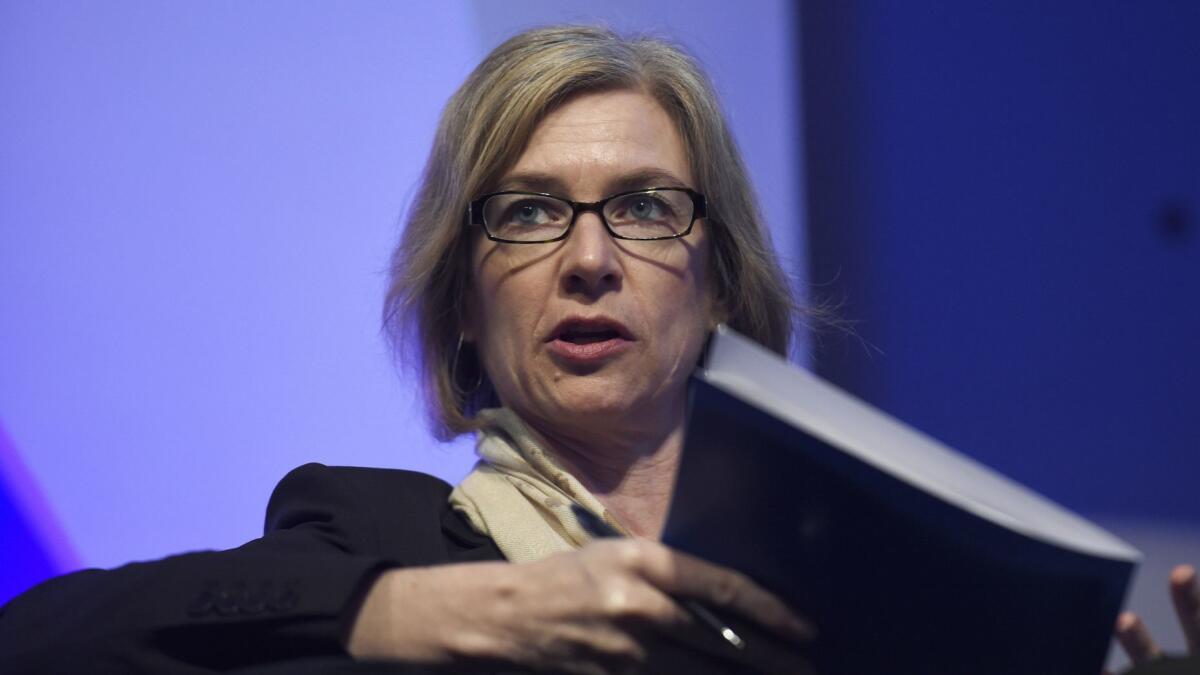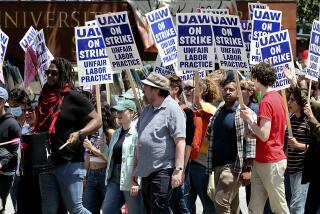Column: Reopening conflict between UC and Broad Institute, patent office takes new look at CRISPR history

In an action that could roil a patent market worth billions of dollars, the U.S. patent office has reopened the thorny question of who invented a key CRISPR gene editing technology first—the University of California or the Broad Institute of MIT and Harvard.
The two institutions have been battling each other over CRISPR rights for six years. UC says the inventor is Jennifer Doudna, who is generally credited among researchers as a leader of the team that invented the technology. But the Broad says that its biologist, Feng Zhang, invented a key application of CRISPR—its use on cells of plants and animals, or “eukaryotic” cells.
The matter appeared to be settled in February, when the patent office awarded an all-encompassing patent to UC Berkeley — one that arguably encompassed the Broad’s claims. The patent covered CRISPR “in any setting, both in vitro and within live cells … [and] across every cell type,” as UC crowed in a press release.
The smart money is that this is going to be bad news for the University of California.
— Jacob Sherkow, patent expert
But even then, patent experts suspected there were still some loose ends for the patent office to tie up. They were right. On Monday, the patent office declared an interference between 10 patent applications from UC and 13 patents issued to the Broad, as well as one pending patent application by the Broad.
“It looks like the patent office is going to need to make a decision one way or another about who got there first,” Jacob Sherkow, a patent expert at New York Law School, told me. Based on the outcome of earlier proceedings before the patent examiners, he says, “the smart money is that this is going to be bad news for the University of California.”
UC doesn’t see it this way. “This is all good news for UC,” says Eldora L. Ellison, the university’s outside patent counsel. “We expected that the office would declare an interference, so they could determine who was first to invent the use of CRISPR in eukaryotes.”
She says the proceeding favors UC because it places the Broad’s existing patents at risk, while UC’s existing portfolio of CRISPR patents, which it has already licensed to Caribou Biosciences, a firm co-founded by Doudna to handle licensing to biotech firms, is secure.
The Broad, which was endowed by Los Angeles billionaire Eli Broad, also professed confidence in the outcome. “We welcome this action,” it said in a prepared statement.
The Broad observed that the patent office “designated Broad, MIT and Harvard as the Senior Parties and [UC Berkeley] as the Junior Party,” which means Berkeley initially will have the burden of proof in showing that its patents covered eukaryotic cells. “This further underscores the significance of Broad’s prior claims,” the statement said.
Ellison says that issue will be covered in the proceeding’s first phase, which will take about a year. In the second phase, which will turn to who invented the relevant CRISPR technology first, the burden of proof may shift.
The patent office proceeding might be a minor legal sideshow if not for the billions of dollars that could be reaped by patent holders licensing CRISPR for use in agriculture, chemistry and medicine.
CRISPR allows the cutting and splicing of DNA sequences with unprecedented precision and speed, offering the possibility of splicing away genetic mutations that cause disability, making cells resistant to genetic disorders and creating plant strains immune to fungal diseases.
Researchers have used CRISPR in the lab to remove mutations that cause blindness, create cells resistant to the HIV virus, and cure muscular dystrophy in mice. Possible cures for complex genetic-related conditions, such as Alzheimer’s, diabetes and cancer, beckon.
On the darker side, CRISPR may make it easier to create “designer babies” carrying characteristics parents demand, and that could be passed on to future generations with unexpected consequences.
One irony of the interference proceeding is that it’s an anachronism. The question of who was the first to invent used to outweigh the question of who applied for a patent first.
That changed in 2013, when the patent office switched to a standard under which whoever filed a patent application first was entitled to the patent, even if someone else was an earlier inventor.
Under the first-to-file standard, “interference” proceedings such as this one — in which the timing of an invention and the timing of a patent application may be in conflict — are no longer relevant. But the UC and Broad CRISPR patent applications predated the change.
Over the years, each of the institutions has tasted victory and defeat in their mutual contest over CRISPR priority. In an earlier interference proceeding brought by UC, patent authorities rejected its assertion that the Broad patents interfered with its own, but didn’t examine the question of who invented CRISPR first. But on Feb. 8, UC was awarded what seemed to be the all-encompassing patent.
The patent office’s interference declaration means that confusion over CRISPR rights will persist for another year or more, as the proceeding unfolds before the Patent Trial and Appeal Board and its decision gets appealed to federal court.
That helps explain the desire in the biotech field for the two institutions to reach a deal with one another, such as a patent pool that would manage the license rights held by both UC and the Broad as a package. Though their patents cover the same general technology, they’re sufficiently distinct that commercial enterprises may have to pay for license rights from both institutions.
The Broad says a pool or other cooperative arrangement is its preferred solution, too. “For seven years, we have made many attempts to engage University of California, Berkeley,” it said this week. “Broad continues to call on UCB to join discussions for a patent pool or another coordinated licensing approach.” Thus far, UC has turned a cold shoulder to the idea.
Keep up to date with Michael Hiltzik. Follow @hiltzikm on Twitter, see his Facebook page, or email [email protected].
Return to Michael Hiltzik’s blog.
UPDATES:
12:32 p.m., June 27: This post has been updated to clarify the impact of the patent office proceeding on UC and the Broad Institute.
More to Read
Inside the business of entertainment
The Wide Shot brings you news, analysis and insights on everything from streaming wars to production — and what it all means for the future.
You may occasionally receive promotional content from the Los Angeles Times.











